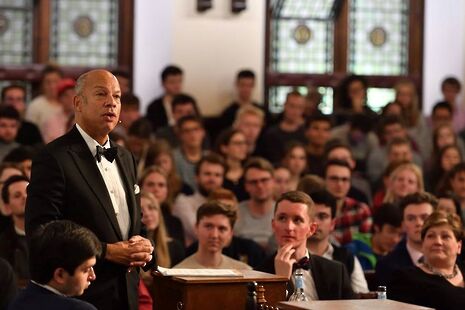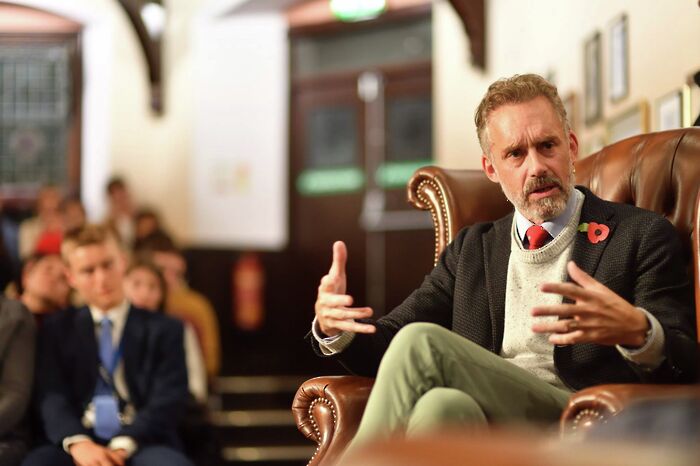Jeh Johnson speaks about the special relationship, illegal immigration, and being the ‘designated survivor’
On the night of the Midterm Elections, Jeh Johnson speaks to Naman Habtom-Desta about his experience as Obama’s Secretary for Homeland Security

Yes, he watches Homeland.
With that out of the way, former Secretary of Homeland Security Jeh Johnson came to speak at the Cambridge Union on the night of the US midterm elections. As the final speaker in last night’s debate, he sealed the final victory for the opposition side as he argued for the continued existence and preservation of the special relationship between the United States and the United Kingdom. He began his speech by recounting the day of Trump’s inauguration.
"The push factors of illegal immigration are always more powerful than any level of border security that you can provide on the southern border of the United States"
By virtue of having been the ‘designated survivor’ during the inauguration, Johnson holds the distinction of being the first man to resign from the Trump Administration. This anomalous situation arose from the fact that he was chosen as to be the person who is moved to a distant location during an assembly of the president and other senior officials so as to ensure that the line of presidential succession is maintained. This is a concept so popular that it has even become the premise of TV show, where a fictional Secretary of Housing and Urban Development finds himself thrust into the role of president.
Instead of clocking out at noon on 20 January 2017, Johnson remained at his desk awaiting the Senate confirmation of his successor. For seven and a half hours, Johnson made up the entirety of the Trump Cabinet.
During the debate Johnson cited how culturally enamoured the United States is by the United Kingdom. Whether it was the popularity of Downton Abbey or how “House of Cards was inspired by House of Cards,” it was clear that for the Secretary, a single election cycle could not define the bond between the two states, all the while reiterating his refusal to criticise his government on foreign soil, calling it “bad etiquette.”
Want to get involved with Varsity interviews?
Meet some of Cambridge's most interesting figures and ask your burning questions. Just join our Interviews Writers group or email our Interviews team to express interest.
Perhaps in an attempt to curry favour with the audience, Secretary Johnson highlighted the role that Cambridge plays in solidifying the transatlantic alliance. With close to a thousand Americans currently residing in our colleges and 12,000 alumni having returned to their native country, the veneration held towards institutions such as ours, Johnson claimed, counteracted any political fluctuations. In a way, he argued for an even deeper bond that did not simply result from the returning Americans but by the very decision to sail across the pond in the first place.
Without burying one’s head in the sands, it has been almost impossible to avoid the American coverage of the Central American caravan marching towards the United States’ southern border. Moreover, Trump's midterms ad fixating on migrants was pulled by multiple national networks after widely being condemned as racist. With many migrants to the US fleeing violence in their homelands, I sought to gauge the Secretary’s view on the United States’ role in the instability.
Back in 2009, the presidency of the democratically-elected José Manuel Zelaya Rosales was toppled by a coup d'état, with homicide rates exploding since, along with killings of journalists and activists. American aid (much of it in the form of arms) continued to flow into the small country as people flowed out, and Obama quickly recognised the presidency of Porforio Lobo.
The man who had dealt with a similar uptick in Central American migration in 2014 did not quite see it that way. After asking him if there was a causal relationship between the coup and the current wave of migration, he replied “No, I wouldn’t make that connection.”
Though not a surprising answer considering his position, he did nonetheless continue to elaborate on how “the violence in Guatemala, Honduras, and El Salvador is as bad as on any place on Earth and it has been that way for a while and it is getting worse.”
For the Secretary, “the push factors of illegal immigration [primarily caused by the dangers of gang violence] are always more powerful than any level of border security that you can provide on the southern border of the United States and that is probably true of migration all throughout the world.” The solution that he believed was necessary, consequently, was not just merely fortifying the frontier but addressing the root causes of migration.
The problems afflicting the United States, and indeed countries all over the globe, are more often than not institutional in nature, with the biggest arguably being the revolving door between big business and government.
As such, I seized the opportunity to ask him about the ethics of senior government officials, such as himself, who led the War on Terror going on to work for major armament producers, with Secretary Johnson currently sitting on the board of directors of Lockheed Martin, the world’s largest corporate defence contractor with billions of dollars worth of US government contracts.
He responded by saying that, “we do have, in law, a two year cooling off period where I am not allowed to represent an interest back to the Department of Homeland Security ... and I think that is a good practice.”
After a brief moment of consideration, I decided to ask him about his time as the General Counsel for the Pentagon. During the 2011 NATO bombing campaign of Libya, in his capacity as the chief legal officer for the Department of Defense, Johnson advised President Obama to seek Congressional authorisation since the United States was involved in ‘hostilities.’ I therefore asked him if he felt Obama had violated the War Powers Resolution by not acquiring either explicit approval from the United States Congress or the United Nations Security Council for the airstrikes against Libyan ground forces.
“No comment.”
 News / Newnham postgrads referred to homeless charities as College runs out of rooms31 July 2025
News / Newnham postgrads referred to homeless charities as College runs out of rooms31 July 2025 Arts / William Morris’ little-known labours in Cambridge25 July 2025
Arts / William Morris’ little-known labours in Cambridge25 July 2025 Lifestyle / Break-ups in the bubble31 July 2025
Lifestyle / Break-ups in the bubble31 July 2025 News / Lucy Cav secures £47m loan to expand student accommodation30 July 2025
News / Lucy Cav secures £47m loan to expand student accommodation30 July 2025 Theatre / One year, many stages: the fresher actors behind Cambridge theatre31 July 2025
Theatre / One year, many stages: the fresher actors behind Cambridge theatre31 July 2025









